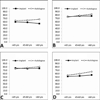Effect of Patient Age on Outcomes in Breast Reconstruction: Results from a Multicenter Prospective Study
- PMID: 27806906
- PMCID: PMC5124383
- DOI: 10.1016/j.jamcollsurg.2016.09.003
Effect of Patient Age on Outcomes in Breast Reconstruction: Results from a Multicenter Prospective Study
Abstract
Background: Although >40% of new breast cancer diagnoses in the US are in older women, few studies have assessed the outcomes of post-mastectomy reconstruction in this population. Our objective was to evaluate age effects on postoperative complications and patient-reported outcomes in women undergoing breast reconstruction, and to investigate whether age effects differ between reconstructive procedure types.
Study design: Eligible patients in the Mastectomy Reconstruction Outcomes Consortium study from 11 institutions (57 providers) in North America were analyzed. Two-year complications and patient-reported outcomes via BREAST-Q domains were compared across younger (younger than 45 years), middle-aged (45 to 60 years), and older (older than 60 years) women. Mixed-effects regression models were used, controlling for a range of demographic and clinical covariates.
Results: A total of 1,531 patients were studied: 494 younger, 803 middle-aged, and 234 older. Age was not a significant predictor of complications. For sexual well-being 2 years post-reconstruction, older women reported 4.25 (p = 0.04) higher mean scores with implant procedures, and 10.39 (p < 0.01) higher mean scores with autologous procedures compared with younger women. No age effect was seen with implant procedures with regard to physical and psychosocial well-being; however, older women who underwent autologous procedures reported 6.07 (p < 0.01) higher physical, and 8.21 (p < 0.01) higher psychosocial well-being scores than younger women.
Conclusions: Age did not significantly affect complication rates. Older women demonstrated higher sexual well-being for both procedures, and better satisfaction and physical and psychosocial well-being than younger women with autologous procedures. Post-mastectomy reconstruction is a viable option for older patients, with risks and benefits comparable with those in younger women.
Copyright © 2016 American College of Surgeons. Published by Elsevier Inc. All rights reserved.
Figures
Similar articles
-
Long-term Patient-Reported Outcomes in Postmastectomy Breast Reconstruction.JAMA Surg. 2018 Oct 1;153(10):891-899. doi: 10.1001/jamasurg.2018.1677. JAMA Surg. 2018. PMID: 29926096 Free PMC article. Clinical Trial.
-
Association of Clinical Complications of Chemotherapy and Patient-Reported Outcomes After Immediate Breast Reconstruction.JAMA Surg. 2021 Sep 1;156(9):847-855. doi: 10.1001/jamasurg.2021.2239. JAMA Surg. 2021. PMID: 34160601 Free PMC article.
-
Patient-Reported Outcomes 1 Year After Immediate Breast Reconstruction: Results of the Mastectomy Reconstruction Outcomes Consortium Study.J Clin Oncol. 2017 Aug 1;35(22):2499-2506. doi: 10.1200/JCO.2016.69.9561. Epub 2017 Mar 27. J Clin Oncol. 2017. PMID: 28346808 Free PMC article.
-
Patient-centered outcomes of breast reconstruction in the setting of post-mastectomy radiotherapy: A comprehensive review of the literature.J Plast Reconstr Aesthet Surg. 2017 Jun;70(6):768-780. doi: 10.1016/j.bjps.2017.02.015. Epub 2017 Feb 28. J Plast Reconstr Aesthet Surg. 2017. PMID: 28416138 Review.
-
Immediate breast reconstruction uptake in older women with primary breast cancer: systematic review.Br J Surg. 2022 Oct 14;109(11):1063-1072. doi: 10.1093/bjs/znac251. Br J Surg. 2022. PMID: 35909248 Free PMC article.
Cited by
-
Tissue Expander Complications Do Not Preclude a Second Successful Implant-Based Breast Reconstruction.Plast Reconstr Surg. 2019 Jan;143(1):24-34. doi: 10.1097/PRS.0000000000005131. Plast Reconstr Surg. 2019. PMID: 30303927 Free PMC article.
-
Implications of Aging in Plastic Surgery.Plast Reconstr Surg Glob Open. 2019 Jan 14;7(1):e2085. doi: 10.1097/GOX.0000000000002085. eCollection 2019 Jan. Plast Reconstr Surg Glob Open. 2019. PMID: 30859042 Free PMC article.
-
Conceptual Considerations for Payment Bundling in Breast Reconstruction.Plast Reconstr Surg. 2018 Feb;141(2):294-300. doi: 10.1097/PRS.0000000000004019. Plast Reconstr Surg. 2018. PMID: 29369980 Free PMC article.
-
Breast cancer patients' postoperative outcomes in nipple-sparing mastectomy and reconstruction with subpectoral implant placement: a single center experience.Gland Surg. 2024 Jul 30;13(7):1164-1177. doi: 10.21037/gs-24-58. Epub 2024 Jul 22. Gland Surg. 2024. PMID: 39175697 Free PMC article.
-
Age Impacts Clinical and Patient-Reported Outcomes following Postmastectomy Breast Reconstruction.Plast Reconstr Surg. 2025 Jan 1;155(1):22-31. doi: 10.1097/PRS.0000000000011554. Epub 2024 May 21. Plast Reconstr Surg. 2025. PMID: 38780394
References
-
- Howlader NNA, Krapcho M, Miller D, et al., editors. SEER Cancer Statistics Review, 1975–2013. Bethesda, MD: National Cancer Institute; 2016.
-
- Wong SM, Freedman RA, Sagara Y, et al. Growing Use of Contralateral Prophylactic Mastectomy Despite no Improvement in Long-term Survival for Invasive Breast Cancer. Ann Surg. 2016 Mar 8; - PubMed
-
- Jeevan R, Mennie JC, Mohanna PN, et al. National trends and regional variation in immediate breast reconstruction rates. Br J Surg. 2016 Aug;103(9):1147–1156. - PubMed
Publication types
MeSH terms
Grants and funding
LinkOut - more resources
Full Text Sources
Other Literature Sources
Medical


